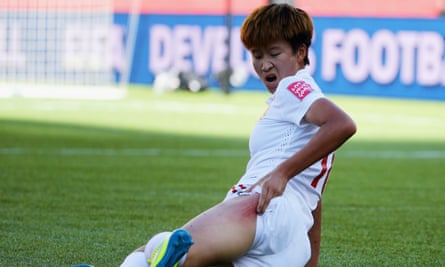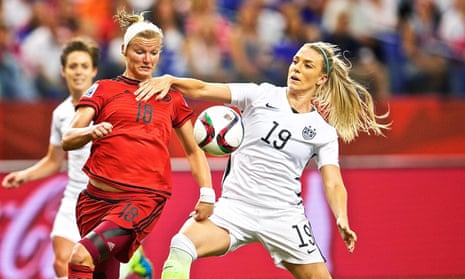Whoever wins the Women’s World Cup on Sunday will receive a $2m cash prize from Fifa. It’s a handsome reward for a job well done at the highest level. That is, unless it’s put into a broader context: when the German men won the World Cup in Brazil last year, they were given $35m.
The Women’s World Cup is the same tournament as the men’s version in many ways, but there are some behind-the-scenes differences that signal they aren’t quite the same tournament yet.
“In the last four to five years, it’s been changing more than maybe in the last 10 or 15,” USA midfielder Megan Rapinoe said on Friday. “Since the last World Cup, we’re getting paid more, other teams are being paid more. Fifa is still doing crazy things like putting our World Cup on artificial turf, but I think the people with the money just need to realize there is money to be made in our game and I think they’re seeing that now.”
There’s more money for the women, but it’s still a tiny sliver of what is on the table for the men. In total, $576m was on the line for the participants of men’s tournament last year, while just $15 million in prizes is available for the women in Canada. For the women, that’s around 2.6% of what was available for the men. Fifa spent more on its feature film about itself called United Passions, which reportedly cost $24m.
Jerome Valcke, Fifa’s secretary general, has argued the men’s World Cup prize money pool is so much larger because the men’s tournament generates more revenue. The men’s World Cup “brings in $4.5bn direct to Fifa,” he said, and it funds World Cups for youth national teams of both gender, as well as the futsal, beach soccer and club World Cups for men.
But women’s soccer is newer, he added, which means the women could be waiting a long time to earn a payout like the German men did last year.
“We played the [20th] men’s World Cup in 2014, when we are now playing the seventh women’s World Cup,” Valcke said in December. “We have still another [13] World Cups before potentially women should receive the same amount as men. The men waited until 2014 to receive as much money as they received.”
USA or Japan will receive the $2m prize when one of them hoists the trophy on Sunday. That will be an increase from Japan’s $1m prize for winning the 2011 Women’s World Cup.
It’s not just in the prize money where a difference can be seen in how Fifa approaches the women’s version of its top tournament.
As USA was getting ready for a crucial semi-final against Germany this week, they were a little closer to their opponent than they would’ve liked: USA coach Jill Ellis said she almost walked into Germany’s meal room her first day in Montreal. That’s because the teams were sharing facilities next to each other, something that has been happening at every stage of the tournament.
“It is not up to the times. Two teams that are supposed to play against each other shouldn’t be sharing a hotel,” said Germany coach Silvia Neid. “For us, it was difficult having just won against Sweden, and Sweden was pretty sad – we still had to share the elevator with them. You play against each other but you constantly run into each other in the hotel and that shouldn’t happen.”
That’s not the case for the men’s World Cup. During the tournament, Fifa assigns them hotels that are separate from their opponents. Before the tournament starts, teams get their pick of luxury hotels to serve as a base camp with a training field where teams can stay in between games. Such a base camp setup wouldn’t make sense in a massive country like Canada, which spans across five time zones, but Fifa didn’t offer basecamps for the women four years ago in Germany, a country smaller than Texas.
A Fifa spokeswoman told the Guardian their Women’s World Cup procedures around team hotels are in place to ensure all teams have access to quality facilities.
“It is a standard procedure, also done in 2011, in order to offer the same hotel quality, infrastructure, food and other factors for the teams playing each other,” the spokeswoman said in an email. “It currently fits into the transportation concept, security and other elements arranged by Fifa. If it is not possible to have all teams in one hotel – for instance, if a hotel cannot offer enough suitable rooms to cover the needs of all teams – then more than one hotel is chosen.”
Other differences emerged long before the first kickoff in Canada. The draw for the groups that teams would be seeded into, which would determine the paths to certain venues and opponents, was not done randomly by Fifa, but was rather assigned. Fifa later said it was meant to ensure ticket sales at certain venues, a departure from how the men’s bracket is created.

What has perhaps become the symbol how differently Fifa views the women’s version of the World Cup compared to the men’s version is the use of artificial turf. It’s been a topic of debate ever since a group of female players filed a gender discrimination lawsuit last year because no men’s World Cup has been played on anything but natural grass. Fifa president Sepp Blatter has argued fake grass allows soccer to be played in more parts of the world and “artificial pitches are the future” of the sport.
The players are used to it by now, they’ve said, but it still makes recovering after games difficult. “That pitch was hard,” USA midfielder Carli Lloyd said from Olympic Stadium in Montreal after beating Germany in the semi-final. “That was a lot harder than any field we’ve played on. I think there’s cement basically laid underneath so when you stepped onto it, you could actually feel how hard it was.”
Money, it seems, is both the problem and the solution. The women don’t receive the same kind of investment from Fifa as men’s programs do, but they won’t unless Fifa sees a way to generate larger revenues.
The audience for the Women’s World Cup is certainly growing, though. The total attendance in Canada has been 1,278,682, according to the organizing committee – that’s a new record for the largest Women’s World Cup attendance. Television ratings in the US and UK are also setting new records.
“I think people, Fifa included, can’t help but notice how popular this sport is,” Ellis told the Guardian. “It’s like anything: there is always an evolution, there’s always a process to go through before equal footing is gained. I hate to say money is the driving factor in a lot of things, but this is a very popular sport. Sponsors understand it, the general public understands it, so hopefully the establishment takes note and understands that.”
The first Women’s World Cup was played in 1991 and back then, no one was thinking about how it was being given different treatment than the men’s World Cup, former USA player Julie Foudy told the Guardian. That these differences are even being noticed and debated shows growth in how the women’s game is viewed, she said.
If Fifa’s treatment from the women’s game comes from the top, there may be potential for bigger changes ahead, she added. An FBI investigation into alleged illegal activity within Fifa accuses executives of funneling money away from soccer-related programs for money laundering and racketeering, and the charges could result in regime change at Fifa.
“I think this shake-up at Fifa is fantastic because the next Fifa president could have this wonderful platform — here’s one of his pillars for his legacy,” Foudy said. “And it’s not much extra investment needed. Take away the penthouse with the cats.”

Comments (…)
Sign in or create your Guardian account to join the discussion